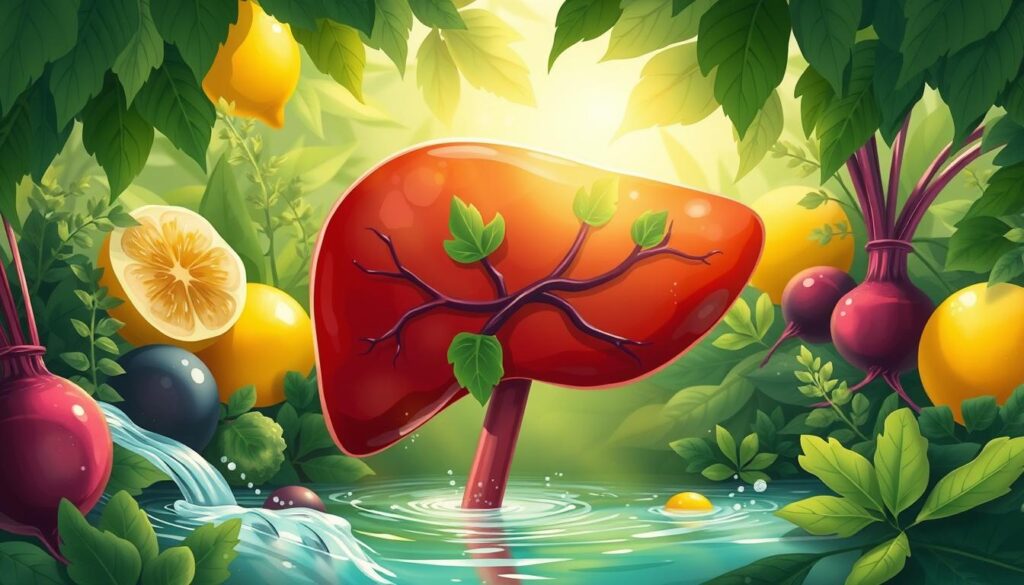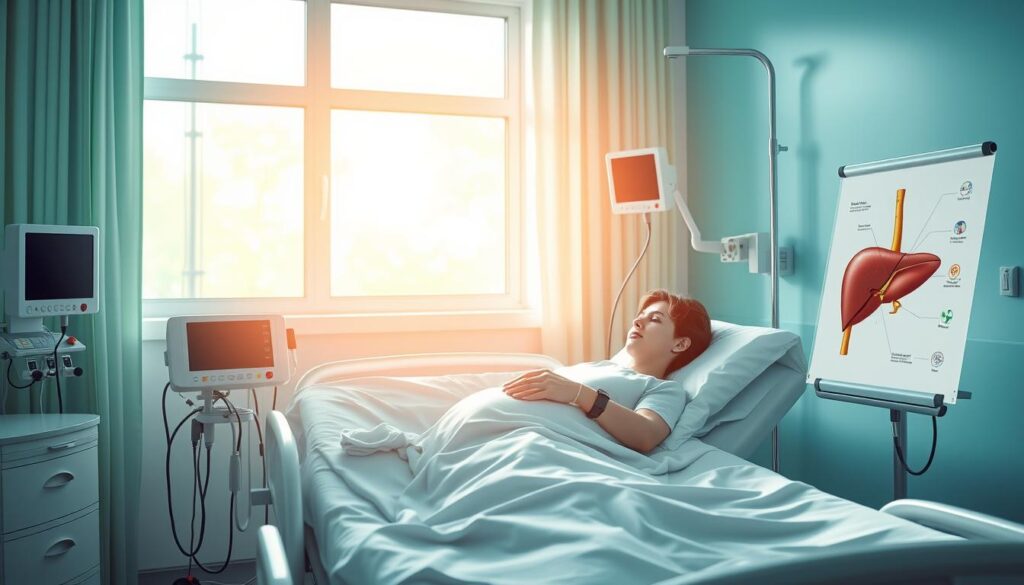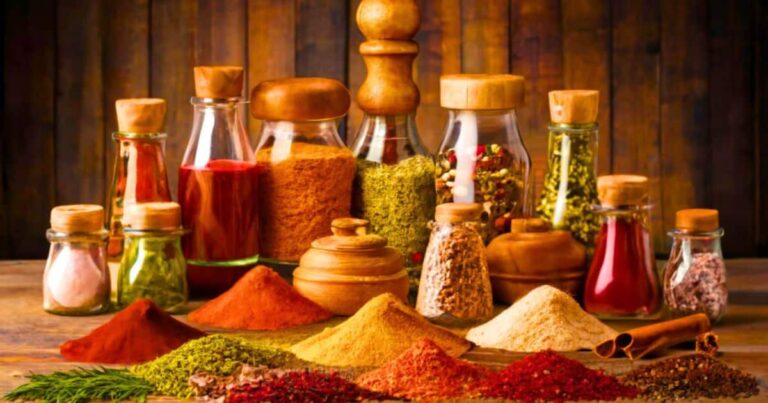About 1.8% of U.S. adults have liver disease, which is around 4.5 million people. The liver is key to our health, and damage can cause serious problems. Luckily, the liver can heal itself. But how long does it take, and what affects liver health?
The liver starts healing a few days after stopping alcohol. It can take weeks to months to fully heal, depending on the damage. Knowing how the liver heals is important for keeping it healthy. Early treatment of liver disease can prevent serious damage. Regular check-ups and liver tests are vital for liver health.
Key Takeaways
- The liver has a natural ability to heal itself through the liver healing process.
- Approximately 1.8% of U.S. adults have liver disease, affecting about 4.5 million people.
- Healing of the liver can begin within a few days after stopping alcohol consumption.
- Complete healing can take weeks to months depending on the severity of the damage.
- Early detection and treatment of liver disease can help prevent permanent damage and promote liver health.
- Regular check-ups and liver panels are essential for maintaining liver health and preventing liver disease.
Understanding Your Liver’s Natural Healing Abilities
The liver is a vital organ that can heal itself after damage. But, diabetes and liver disease can slow down this healing. Diabetes causes inflammation and scarring in the liver, making it harder to recover. Liver disease leads to fibrosis, which also hinders healing.
Studies show the liver can regrow up to 90% of its mass. This is thanks to its ability to create new liver cells and repair damaged tissue. Sometimes, a liver transplant is needed, with over 7,000 people in the U.S. getting one each year.
The Liver’s Regenerative Properties
The liver’s healing power comes from cells like hepatocytes. These cells help maintain and regenerate the liver. They can grow to fix injuries from toxins. Knowing about these cells is key to treating liver disease and keeping the liver healthy.
Factors Affecting Healing Speed
Many things can slow down liver healing, like diabetes and liver disease. Drinking too much alcohol also affects the liver’s recovery. It’s important to watch alcohol intake and live a healthy lifestyle to support liver health.
Signs of Liver Recovery
Signs of liver recovery include better liver function, less inflammation, and more energy. It’s vital to work with a healthcare provider to track liver health and address any issues. By understanding how the liver heals and supporting its health, we can improve overall well-being and lower liver disease risk.
Changing your lifestyle and using medical treatments can also help liver health. Medication can manage conditions like diabetes. In severe cases, surgery, including liver transplant, may be needed.
| Liver Condition | Healing Time | Supportive Measures |
|---|---|---|
| Mild liver damage | Several weeks | Lifestyle changes, medication |
| Moderate liver damage | Several months | Medication, surgical intervention |
| Several months to years | Liver transplant, ongoing medical care |
How Long Does It Take to Heal Your Liver?
The liver can heal itself, but how long it takes depends on the damage. Mild damage might heal in a few weeks. But, more serious damage could take months or even years.
Improving liver health starts with stopping alcohol. You can see big improvements in liver function in a few weeks to months after quitting.
For hepatitis, the liver’s healing might be slower. Getting medical help quickly is key to avoid more damage. Eating well and exercising regularly can also help your liver heal.
Here are some general healing times for the liver:
- Mild liver damage: a few weeks to heal
- More severe liver damage: several months to years to heal
- Alcohol-related liver disease: up to 5 years for complete healing
- Non-Alcoholic Fatty Liver Disease (NAFLD): improvements in liver health can be seen within 6 months following significant lifestyle changes

Remember, liver recovery times vary. It’s important to see a doctor regularly and live a healthy lifestyle. This helps support liver healing and improves liver health.
Common Causes of Liver Damage
Liver damage can happen for many reasons, like lifestyle choices, medical issues, and environmental factors. Knowing what causes liver damage is key to preventing and treating it. The liver is vital for detoxifying our bodies. Damage to it can lead to serious problems. Supplements like obat liver can support liver health, but we must tackle the root causes of damage.
Some common reasons for liver damage include:
- Alcohol-related liver disease, which can cause inflammation and scarring in the liver
- Viral hepatitis, such as hepatitis B and C, which can cause liver damage and increase the risk of liver cancer
- Non-alcoholic fatty liver disease, which is characterized by the accumulation of fat in the liver
- Medication-induced liver damage, which can occur due to certain medications, such as acetaminophen
Detoxification is essential for removing toxins from our bodies, and the liver is key in this process. Supporting liver health through a healthy diet, regular exercise, and obat liver supplements can help with detoxification and overall well-being.

| Cause of Liver Damage | Description |
|---|---|
| Alcohol-related liver disease | Causes inflammation and scarring in the liver |
| Viral hepatitis | Causes liver damage and increases the risk of liver cancer |
| Non-alcoholic fatty liver disease | Characterized by the accumulation of fat in the liver |
| Medication-induced liver damage | Can occur due to certain medications, such as acetaminophen |
The Liver Recovery Timeline by Condition
The time it takes for the liver to heal depends on the condition. Mild damage might heal in a few weeks. But, severe damage could take months or even years to recover from. Knowing how the liver heals is key to keeping it healthy and preventing more damage.
Things like how bad the condition is, your overall health, and lifestyle changes can affect healing time. For example, people with fatty liver disease can see big improvements by changing their diet and exercising. These actions help the liver heal.
Eating a balanced diet with lots of fruits, veggies, and whole grains can boost liver health. Studies show that up to 80% of people with moderate liver disease can see improvements with lifestyle changes. Also, not drinking alcohol and keeping a healthy weight can help the liver recover.

If you think you have liver damage, you should see a doctor right away. Early treatment can help the liver get better and prevent more damage. By understanding the healing process and taking steps to support liver health, you can lower your risk of liver disease and stay healthy.
| Condition | Recovery Timeline |
|---|---|
| Mild liver damage | A few weeks to several months |
| Severe liver damage | Several months to years |
| Fatty liver disease | Several months to years with lifestyle modifications |
Natural Methods to Support Liver Healing
Keeping your liver healthy is key to feeling good overall. Eating well, with lots of fruits, veggies, and whole grains, helps your liver. Also, staying active and managing stress through meditation or yoga is good for your liver.
Some supplements and herbs, like milk thistle and turmeric, are great for your liver. They can lower inflammation and help your liver heal. Plus, keeping a healthy weight and not drinking too much alcohol also helps your liver.

- Eat a balanced diet rich in fruits, vegetables, and whole grains
- Exercise regularly and reduce stress
- Get enough sleep and maintain a healthy weight
- Avoid excessive alcohol consumption and limit intake to recommended levels
- Consider incorporating beneficial supplements and herbs, such as milk thistle and turmeric, into your diet
| Liver Health Tip | Benefits |
|---|---|
| Eat a balanced diet | Supports liver function and reduces risk of liver disease |
| Exercise regularly | Improves liver health and reduces inflammation |
| Get enough sleep | Supports liver regeneration and overall health |
By adding these natural steps to your daily life, you can help your liver stay healthy. This can also lower your risk of liver disease.
Medical Treatments and Their Recovery Periods
Medical treatments are key to improving liver health and aiding in recovery. For those with liver damage from diabetes, medications can manage the condition and prevent more damage. Sometimes, a liver transplant is needed for severe liver disease.
After a liver transplant, recovery times vary. It can take weeks to months. During this time, following a strict medication and lifestyle plan is vital. This helps the liver heal and prevents rejection.

It’s critical for transplant patients to stay in close contact with their healthcare team. This helps monitor progress and handle any complications. Doing so can lead to a successful recovery and better quality of life.
Several factors can affect recovery after a transplant. These include overall health, presence of conditions like diabetes, and following the treatment plan. Understanding these and working with healthcare can help individuals recover well and avoid complications.
Risk Factors That May Delay Liver Recovery
People with diabetes and liver disease might take longer to recover. Age is also a big risk, as older folks are more likely to get liver disease. Smoking and drinking too much alcohol can also slow down recovery, showing how important it is to change these habits for better liver health.
Eating right is key for the liver to heal. You should eat lots of fruits, veggies, lean meats, and whole grains. It’s also vital to get regular check-ups and liver tests to keep an eye on liver health. How often you need these tests depends on how damaged your liver is.
Not drinking alcohol is a must when your liver is healing. Alcohol can really slow down the process. Quitting smoking can also help your liver work better and heal faster. Knowing these risks and making healthy choices can really help your liver health and speed up recovery from liver disease.
| Risk Factor | Impact on Liver Recovery |
|---|---|
| Underlying medical conditions | May slow liver healing |
| Age | Older adults may be more susceptible to liver damage |
| Lifestyle factors (smoking, excessive alcohol consumption) | Can delay liver recovery |
Monitoring Your Liver’s Healing Progress
When your liver starts to heal, it’s key to keep an eye on how it’s doing. You can do this with blood tests, noticing how you feel, and seeing your doctor regularly. For those with hepatitis, watching your liver closely is vital to avoid more harm and help it get better.
Regular blood tests can show how well your liver is working. They check for certain enzymes and proteins in your blood. Also, if you’re feeling tired, sick to your stomach, or have belly pain, it might mean your liver is hurt. Telling your doctor about these feelings can help them see how your liver is healing.
Some important signs of a healthy liver include:
- Improved energy levels
- Reduced fatigue
- Improved digestion
- Clearer skin
- Greater sense of well-being
By keeping an eye on your liver’s health and talking to your doctor about any issues, you can help it heal better. For those with hepatitis, staying on top of treatment and monitoring can help manage the condition and protect your liver.
| Indicator | Description |
|---|---|
| Liver function tests | Measure the levels of certain enzymes and proteins in the blood |
| Physical symptoms | Include fatigue, nausea, and abdominal pain |
| Regular check-ups | Help track liver recovery and address any concerns or complications |
Prevention Strategies for Long-term Liver Health
To prevent liver disease, it’s important to make healthy lifestyle choices. Eating a diet full of fruits, vegetables, and whole grains is key. Regular exercise helps reduce inflammation and supports liver health. Stress reduction techniques like meditation and yoga are also beneficial.
It’s vital to avoid too much alcohol and get vaccinated against hepatitis. Here are some important prevention steps:
- Maintain a healthy weight through diet and exercise to reduce the risk of nonalcoholic fatty liver disease
- Limit alcohol consumption to no more than three drinks per day for men and two drinks per day for women
- Get vaccinated against hepatitis A and B
- Avoid sharing needles or other equipment that can spread infectious diseases
By following these steps, you can lower your risk of liver disease. It’s important to know the risks, like obesity and too much alcohol. Taking action to prevent liver disease helps keep you healthy and well.
Conclusion: Taking Control of Your Liver Health Journey
Starting your liver health journey means you have the power to heal and keep your liver healthy. You can support your liver’s natural healing by understanding its amazing abilities and what affects it. This knowledge lets you take steps to help your liver recover.
If you’re dealing with liver damage or a chronic condition, making lifestyle changes can help. Eating well, exercising regularly, and using supplements can boost your liver’s healing. Also, getting medical help early and watching your progress is key to getting better faster.
Your liver can heal itself, but it needs your dedication and care to do so. By controlling your liver health, you can not only fix your liver but also avoid future problems. Use what you’ve learned to support your liver’s healing process and keep your liver healthy for the long term.





